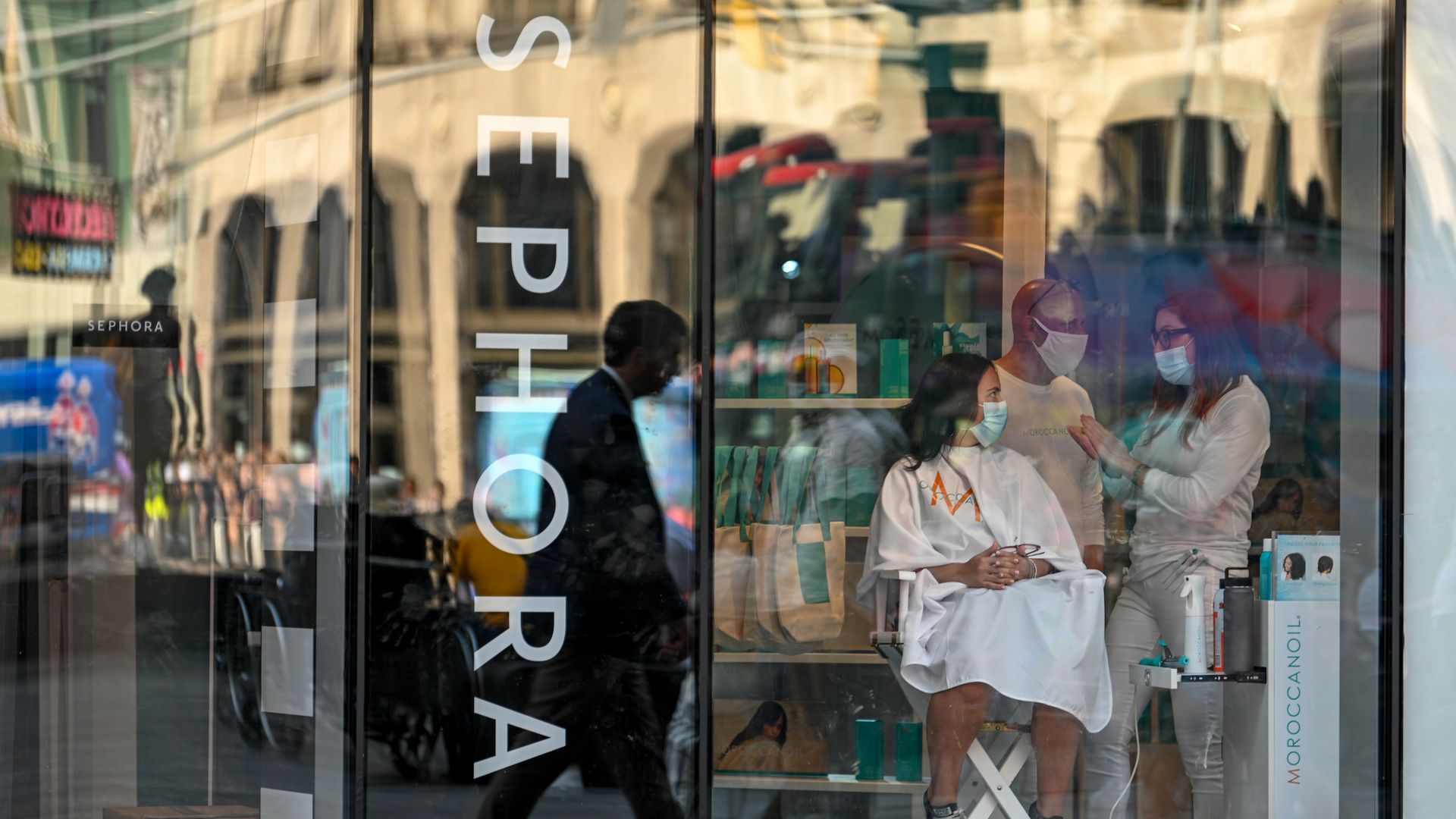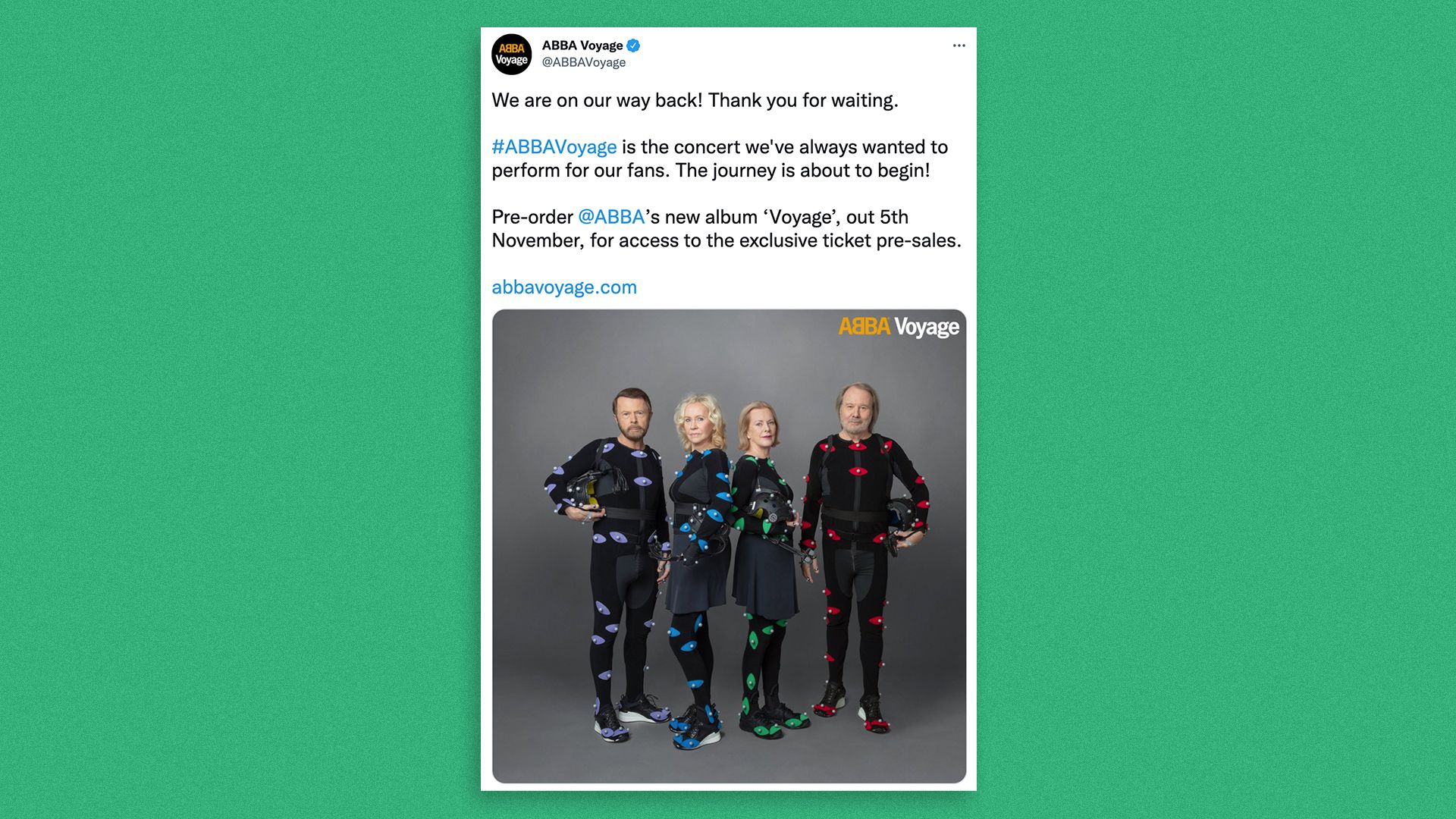| | | | | | | Presented By Walmart | | | | Axios What's Next | | By Jennifer A. Kingson, Joann Muller and Erica Pandey ·Sep 03, 2021 | | It's hard to believe that Monday night — Labor Day — is Rosh Hashanah! Happy 5782 (the Jewish new year that will begin then), and we hope everyone enjoys a sweet long weekend. - Brace yourself: Axios What's Next will be taking next week off (and not because some of us will have overindulged in Manischewitz). We'll be back in your inbox on Monday, Sept. 13.
- Meanwhile, your assignment is to send us a photo you took that tells us something about What's Next. What is next? Share your pix and thoughts with us at whatsnext@axios.com.
- Today's contest winner is Michael Barney Smith, whose picture appears at the bottom.
Today's Smart Brevity count: 980 words ... 3.5 minutes. | | | | | | 1 big thing: Cities try to combat "urban heat islands" |  | | | Children play in a fountain in Brooklyn, New York, last month, when there was an excessive heat alert in the city. Photo by Ed Jones/AFP via Getty Images | | | | Hot times, summer in the city: As rising temperatures turn urban centers into smoldering heat bubbles, cities are turning to technology like reflective pavement coatings and "cool roofs," Jennifer A. Kingson writes. Why it matters: Climate change will keep making cities hotter, and municipal leaders are starting to acknowledge that planting trees, opening "cooling centers" and putting white paint on streets and rooftops will not be enough. What's happening: A growing number of startups are crowding into the market for products to counter "urban heat islands," with experimental (and proven) technologies aimed at absorbing or reflecting surface heat on roads, sidewalks, buildings and other structures. - "It's really an exciting time," Kurt Shickman, executive director of the Global Cool Cities Alliance, a 10-year-old nonprofit based in Washington, D.C., tells Axios. "The concept [of using technology to offset the sun's energy] is not new, but we are seeing a lot of innovation in the space now. "
- His organization — with 70 member cities worldwide, including 25 in the U.S. — is dedicated to "passive cooling" techniques, which don't rely on electricity (vs. "active cooling" like air conditioning).
While "cool roofs" have been around for more than 30 years, the technology is evolving rapidly, Shickman says: "For any type of roof you can imagine, there is a way to make a cooler version of it. That's really where the innovation sits on that side." - "A cool roof is one that has been designed to reflect more sunlight and absorb less heat than a standard roof," per the Department of Energy. "Cool roofs can be made of a highly reflective type of paint, a sheet covering or highly reflective tiles or shingles."
On the pavement side, the market has "really only been around for about a decade — it's a very young market," Shickman says. - Cool pavement is "a water-based asphalt treatment that is applied on top of the existing asphalt pavement," per the city of Phoenix, which is doing the largest U.S. demonstration of the technology and will present its findings virtually on Sept. 14.
- "It's made with asphalt, water, an emulsifying agent (soap), mineral fillers, polymers and recycled materials," a city website explains. "It contains no harmful chemicals and is compatible with traditional asphalt."
But creating cool pavements "is more complicated than roofs," says a report issued in July by Climate Central. "In cities with urban canyons, the sunlight may not even reach the street level long enough to make a significant difference." Details: Cities like Los Angeles, Phoenix and Tokyo are in the vanguard of using cool pavement technology to combat urban heat islands. - New York and San Antonio and Austin, Texas, are in discussions about it, per Shickman.
Read the full story |     | | | | | | 2. Here are the next states that could pass abortion bans after Texas |  Data: Axios Research; Map: Sara Wise/Axios An abortion ban in Texas successfully went into effect, making the procedure illegal when cardiac activity is detected, usually as soon as six weeks and well before many people know they are pregnant, according to Axios' Oriana Gonzalez and Sara Wise. The big picture: Over a dozen states have tried to enact laws similar to the near-total abortion ban in Texas, but they have mostly been blocked or struck down by federal or state judges. Now, with this current precedent, some of these states could try again. - North Dakota, Iowa, Arkansas, Alabama, Mississippi and Georgia all attempted to implement restrictive bans that were declared unconstitutional.
- Missouri, Kentucky, Tennessee, South Carolina and Ohio passed laws that were temporarily blocked.
Other states, like Idaho and Louisiana, have what are commonly known as "trigger laws," meaning that their abortion restrictions could become effective if other similar legislations are passed. What to watch: Lawmakers in Florida have already said they will be considering similar restrictive bills, which are also known as "heartbeat bills." - Texas Right to Life, an anti-abortion rights group that helped write the legislation, is working with anti-abortion rights activists in other states who want to replicate the ban, NPR reports.
Read the full story |     | | | | | | 3. What we're reading |  | | | A customer gets a makeover at a Sephora store in Times Square. Photo by Alexi Rosenfeld/Getty Images | | | | Beauty's new combat zone: Speed and convenience (Vogue Business) To slake consumers' demand for instant access to limited-edition lipsticks and the like, prestige brands are forming partnerships with big-name delivery platforms: Estée Lauder is working with Uber, Sephora is working with Instacart, etc. New lobbying group to advocate for cities amid potential windfall of federal infrastructure dollars (Smart Cities Dive) The Coalition for Urban Innovation, whose founding members include smart technology organizations like Sidewalk Labs and Via Transportation, says its mission is "to advanc[e] federal policies that make our cities more sustainable and equitable through technology and innovation." Winemakers Tap Artificial Intelligence to Salvage Grapes as Wildfires Rage (WSJ) Vintners are turning to an AI startup called Tastry Inc. to "identify viable blending options that mask unwanted smoky flavors," the Journal reports. "Tastry said that during last year's wildfire season it helped mitigate the loss of over 300,000 cases of wine for more than 100 California producers." |     | | | | | | A message from Walmart | | Walmart to pay for associates' college tuition | | |  | | | | Walmart, the nation's largest private employer, announced it will pay 100% of eligible employees' college tuition as part of a $1 billion, five-year investment in career-driven training. The goal: Create opportunity for associates to grow their careers at Walmart and beyond. | | | | | | 4. Mamma Mia! Look who's dropping an album |  | | | Screenshot via Twitter. Image: Axios Visuals | | | | ABBA has a new album coming out Nov. 5 — its first in 40 years — and will play what the band calls a "revolutionary" concert in London next spring. - A dedicated ABBA Voyage Twitter account says the band is building its own arena: "A state-of-the-art, purpose-built 3,000 capacity arena at Queen Elizabeth Olympic Park in London, where fans can hear ABBA's hits and some new music."
- You can listen to two of the new songs on the ABBA Voyage website.
- For those of you who did not spend junior high school listening to "Dancing Queen" nonstop, ABBA is a Swedish band formed in 1972 and named for an acronym of its members' names: Agnetha Fältskog, Björn Ulvaeus, Benny Andersson and Anni-Frid Lyngstad.
|     | | | | | | 5. Reader photo of the day |  | | | Photo: Michael Barney Smith | | | | What's Next: Water shortages curtail recreation options Michael Barney Smith writes: This photo "was taken at Gifford Pinchot State Park, in York County, Pennsylvania. "Unfortunately, while it is beautiful, the lake was closed to swimmers because of drought. It hasn't been open all year." |     | | | | | | A message from Walmart | | Walmart adds tuition free education benefit for eligible associates | | |  | | | | Walmart announced it will pay 100% of college tuition and books for U.S. associates as part of its Live Better U program. Approximately 1.5 million part-time and full-time U.S. associates can now pursue college degrees and learn trade skills without the burden of education debt. More info. | | | | Enjoy your Labor Day weekend! Be on the lookout for photos that speak to What's Next in our lives. Send them to whatsnext@axios.com. And please tell everyone at your cookout to sign up for Axios What's Next. Subscribe here. |  | | It'll help you deliver employee communications more effectively. | | | | | | Axios thanks our partners for supporting our newsletters. If you're interested in advertising, learn more here.
Sponsorship has no influence on editorial content. Axios, 3100 Clarendon Blvd, Suite 1300, Arlington VA 22201 | | | You received this email because you signed up for newsletters from Axios.
Change your preferences or unsubscribe here. | | | Was this email forwarded to you?
Sign up now to get Axios in your inbox. | | | | Follow Axios on social media:    | | | | | |









No comments:
Post a Comment